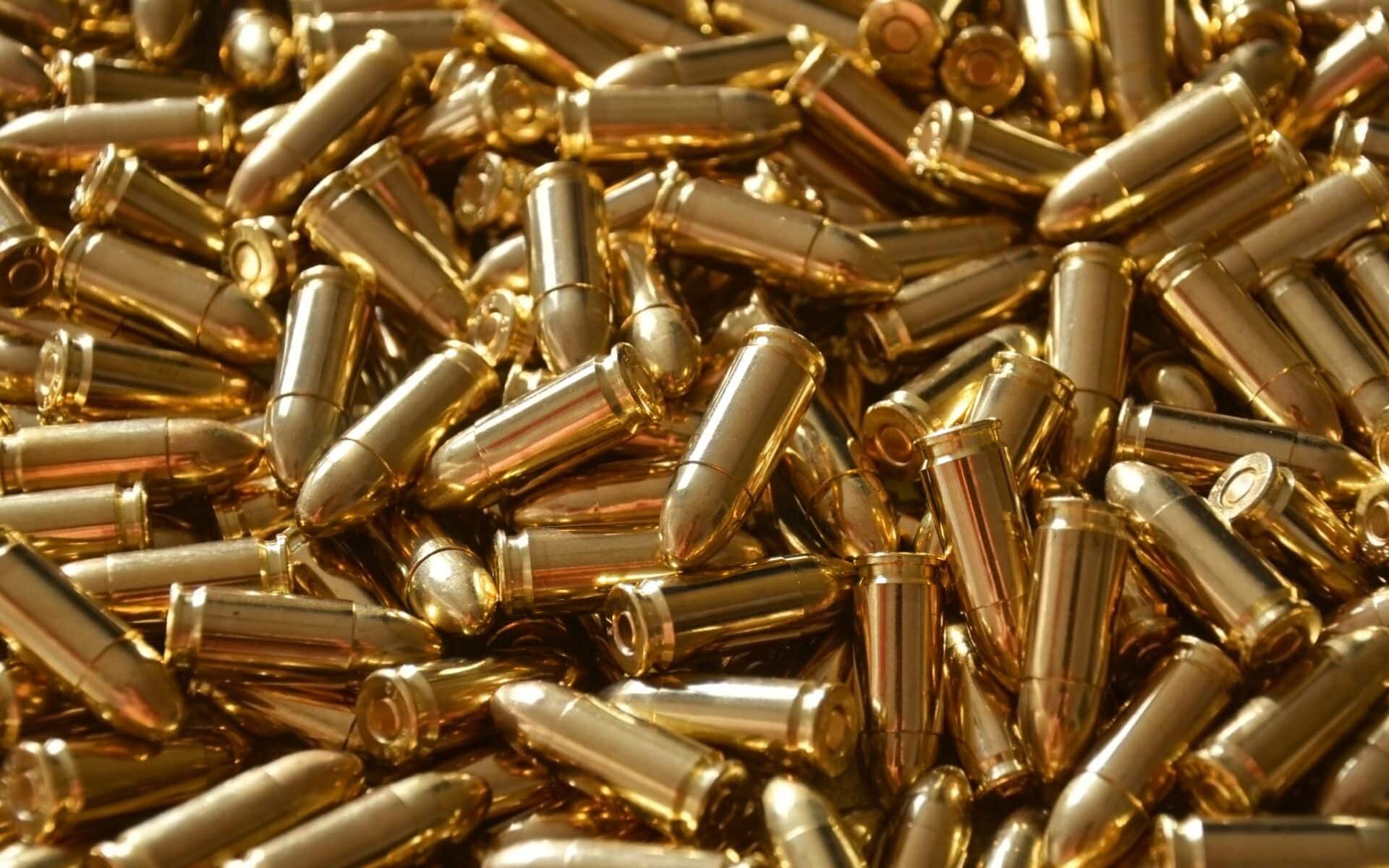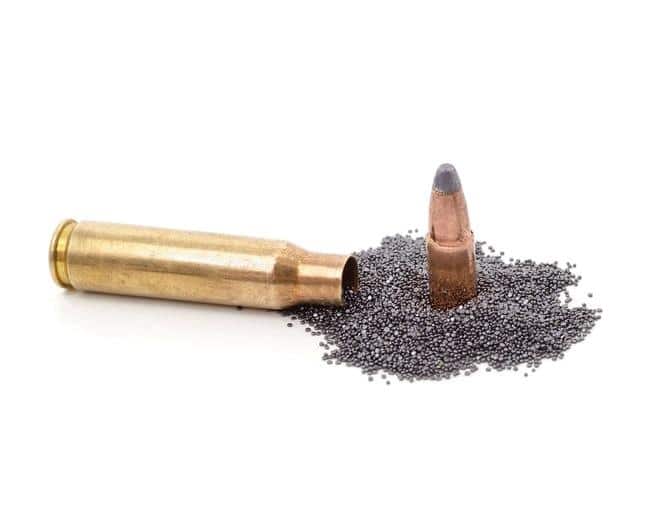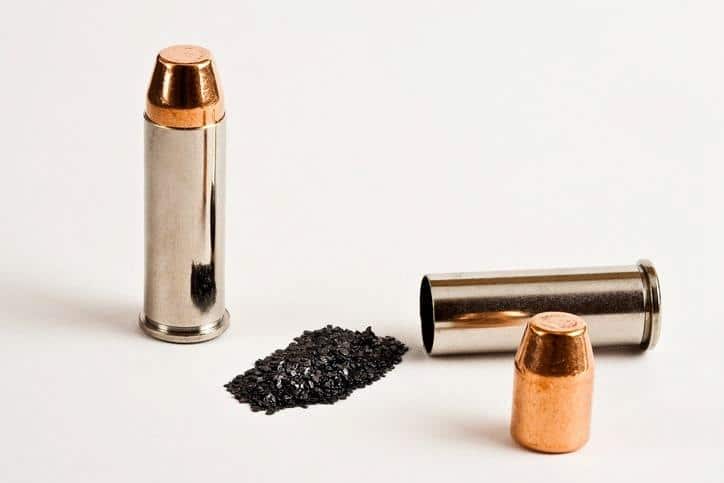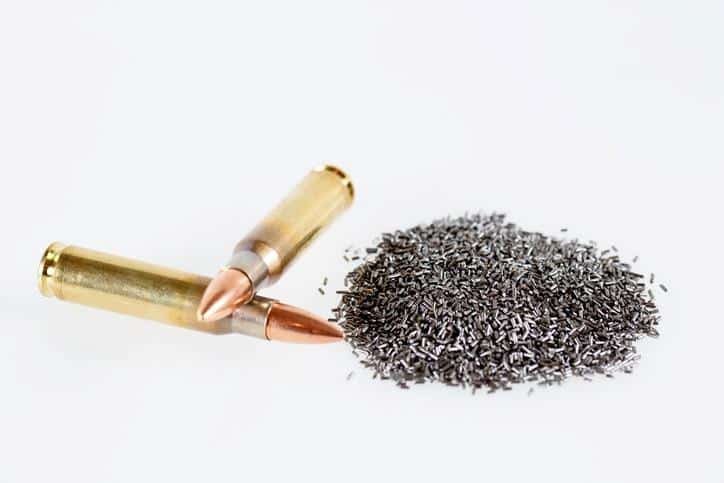Your cart is currently empty!

What Are Grains in Bullets?
Grains, which are abbreviated as (gr), is a system that describes the weight or mass of a bullet. Bullet weight is an important consideration for anyone who is shooting to hit a target. A single grain is 1/7000 of a pound.
Why is Bullet Grain Important?

Bullet grain impacts bullet performance. For example, most lightweight bullets have a flatter trajectory in comparison to bullets with heavier grain weight. There are many factors that go into bullet performance and grain weight is one of those.
The overall recipe of the bullet includes the grain mass or weight. Other factors such as:
- Barrel length
- Muzzle Velocity
- Bullet design – flat nose, hollow point, round nose, etc.
- Caliber
- Shooter skill and technique
- Weather and environmental conditions
All have an impact on how well a bullet performs. Grain weight or mass impacts:
- Velocity – greater velocity or decreased velocity – bullet speed
Twist rate - Accuracy – long-distance target vs. short-distance target.
Kinetic energy - Impact and damage capabilities
Different weights for bullets have different purposes depending on how you set up the bullet during manufacturing. It is a ratio of grain to the performance that you want to pay attention to. This is an argument about accuracy, speed, and impact that is confirmed by the goals that you need the bullet to achieve. Do you need maximum accuracy? Do you need to make longer shots? Do you need the bullet to do the most damage at close range?
The same grain weight of the bullet will perform differently under the goals you have. A bullet for deer hunting may not be the best option for self-defense. A lighter bullet may not do as much damage as a heavier bullet. A lighter-grain bullet will likely have lighter recoil than a heavier bullet. Shooting goals are very important and grain weight plays a huge role in how well your bullet stacks up to your shooting goals.
Advantages of a Lighter Bullet

There are many advantages for shooters who choose lower grain bullets – lighter bullets. Those include:
Longer Distance – A lightweight bullet travels farther using less energy. There may not be as much impact at longer distances, but they can be very effective for target shooting, hunting, and accuracy at long distances. The drop in impact also means there is a decrease in the danger or ricochet, enabling hitting a long-distance intended target.
Flat Trajectory – To counter gravity, a heavy bullet has to fly in a steeper arc. A lighter bullet experiences less gravitational force and can fly at a flatter trajectory.
Hunting Shy Game – A lightweight bullet travels farther making it possible to take down small game that is aware of its surroundings. A lighter projectile is good for small predators such as coyotes and for vermin such as prairie dogs and ground squirrels. Lightweight bullets may not be big enough to take down large game, but they work well on smaller animals.
Easier Shooting – A lightweight bullet has less recoil than a higher-grain bullet. That means when you shoot, there is less recoil. That can be a big deal for people with small hands or those who fear the pain of heavier recoil.
Terminal Ballistics – Lighter projectiles mean a decrease in terminal ballistics – generally, we are talking about bullet penetration. With less mass, the bullet may not do as much damage or penetrate as deeply as a heavy grain weight bullet even though they often have a higher velocity. This is one reason light-grain weight bullets are good for smaller game hunting, long-distance target practice, or high-precision shooting.
Practical Applications of a Lighter Bullet
Plinking – Backyard target practice or competitive shooting is applicable for light-grain weight bullets. If your goal is distance, flat trajectory, and low impact, then a light grain weight bullet will work just fine.
Hunting – Small game hunting, especially at a distance requires a bullet that will hit the mark. Lightweight bullets are a good option for hunting small game such as ground squirrels, coyotes, etc.
Self-defense – There are a few arguments about using small grain-weight bullets for self-defense. They come down to this point – Fear of recoil. If the shooter is afraid of the gun, they may not use it. If they have the option of using lower-grain bullets, there is less recoil, and they may shoot the gun. It is also easier to teach someone how to shoot and control recoil with a lightweight bullet in smaller calibers – A .22 vs. a .357 Magnum. While bullet weight does not specifically impact recoil – that’s more of a caliber issue – it does play a part.
In self-defense situations, a lightweight grain bullet may be just what you want. They fly faster and they do not penetrate as much meaning that there is less chance of a round piercing a wall and wounding an unintended target.
Performance Considerations
Ballistic coefficient – Lightweight grain bullets have a decrease in ballistic coefficient stats, especially when it comes to distance and penetration.
Muzzle velocity – is often faster with light grain weights because there is less mass there, the bullet requires less energy to push it. It will also go farther because it has less impact from gravity.
Recoil – is often less with lightweight bullets. They do not need as much push or muzzle velocity to reach the target and that means the recoil can be significantly less.
Advantages of a Heavier Bullet

Heavier weight grain bullets expectedly are the opposite of lightweight bullets. They are more of a close-quarters option with more impact and higher recoil.
Applications of Heavier Bullets
Target Shooting – Great at close-quarters and near-distance targets. Some may be less accurate at distances over 50 yards. Generally, expect higher muzzle energy dues to the increased mass of the bullet. Most calibers of bullets are available in different bullet weights and that is important. It means you can choose the right weight to fit your shooting needs.
Hunting – Larger grain weight means that you are taking bigger targets closer to you. Depending on the caliber and whether you are firing with a handgun or a rifle will cause a difference in accuracy at distance. A heavier round creates more of an impact, so ballistic statistics go up and the ballistic coefficient means a taller arc to the bullet once fired.
Self-Defense – If you expect the contest between an intruder and yourself to be a one-shot outcome, the heavier bullet is a good choice. They are slower – with less muzzle velocity – generally than a lightweight bullet, and they generally have more recoil. That means more time aiming between shots. They can also be dangerous in terms of going through walls and potentially wounding unintended targets.
Performance Considerations
Ballistic coefficient – Slower velocity with greater impact due to the size of the bullet. Heavy bullets have a greater arc so do not expect a flat trajectory. They also have more impact from gravity meaning that they can be short to the target and blown off-course by the wind or impacted by environmental conditions. Expect deeper penetration and more damage from a heavy bullet.
Muzzle velocity – Slower than a light bullet, but that may not matter in a close-quarters situation.
Recoil – it takes more power to launch a heavy bullet than a light bullet. The recoil with higher grain weights is greater.
The Berry’s Bullets Difference
Berry’s Manufacturing offers bullets to gun enthusiasts throughout the United States and around the world. With over 60 years and several generations of experience, Berry’s is the place to shop for bullets of all styles.
- Family-owned and operated for three generations
- Fully invested in the art of shooting and design
- Engaged in shooting at every level – hunting, target practice, competitive shooting, self-defense
- Exacting standards for perfectly balanced bullets that meet governmental, law enforcement, and NATO standards.
- Dedicated to the home reloading and the manufacturer – with quality supplies that support quality round building.
Berry’s is happy to serve the greater shooting community from to home shooters and competitive shooters to hunters and those who rely on self-defense. We stock and manufacture what you need so you can self-load the type of rounds you want.
